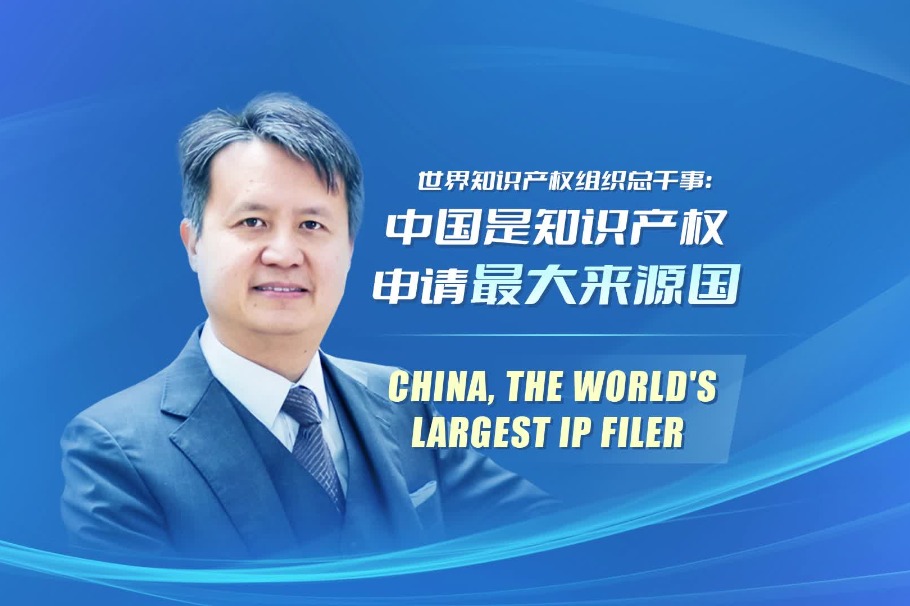Chinese enterprises investing more in intellectual property

BEIJING — In the initial stages of traditional business strategies, enterprises tend to spend money on marketing for fast returns, but an increasing number of Chinese startups are now willing to invest in intellectual property despite a longer period before they see returns.
The pride of Airdoc Technology, a Beijing-based medical device maker, is a wall of patent certificates. Since its establishment in 2015, the company has owned over 500 invention and design patents.
Even during the COVID-19 pandemic, it logged considerable spending on IP management. In August 2020, China's drug authorities approved AI diagnostic software developed by Airdoc for clinical use.
The company also cooperated with big hospitals nationwide on scientific research, the results of which appeared frequently on the pages of international academic journals.
"Patents have boosted the company's competitiveness and made a great contribution to revenue," said Airdoc's Vice-President Wu Xiaolei.
IP plays a crucial role in attracting external investment for enterprises, and enterprises can transform intangible IP into wealth through effective operations, Wu said.
Cost-effectiveness used to be Great Wall Motor's primary competitive advantage in market penetration. But few customers are aware that the domestic carmaker has been the leading patent holder among China's private auto enterprises for several consecutive years, thanks to the company's annual allocation of nearly 100 million yuan ($13.95 million) to IP endeavors.
In recent years, Great Wall Motor has augmented its research and development expenditure consistently, enhancing performance and refining designs, particularly in the domains of new energy vehicles and intelligent software.
In 2023, the company launched an off-road vehicle that not only won China's prestigious design patent award but also became a resounding success, with sales exceeding 280,000 units and profits nearing 20 billion yuan.
With the increasing pace at which Chinese enterprises are going abroad, many private firms have faced IP challenges. In the early years of the 21st century, the originality of a Great Wall Motor design was questioned at a European trade show. And a decade ago, a domestic smartphone brand renowned for its high performance-to-price ratio also found itself embroiled in a patent dispute in India.
Such growth pangs have prompted Chinese enterprises to shift their focus from cost competitiveness to IP competitiveness. They have discovered that the only path to achieving sustainable development is prioritizing R&D while safeguarding innovation.
Tencent's Vice-President Jiang Bo revealed at the 12th China IP Annual Conference that the company has invested an astonishing 180 billion yuan in R&D since 2020.
Tencent stands out as a leading player among global internet giants in terms of patent applications and grants, showcasing the alignment of its innovation input and patent ownership.
The sharing of cutting-edge technologies through open patent licenses has also helped Tencent generate revenue. Describing the tech giant's returns on its IP investment, Jiang said, "If sci-tech innovation is considered an addition, IP would be a multiplication, and using this multiplication effect can create sustainable social value."
While enterprises actively engage in IP investment, the Chinese government has been steadfastly fortifying IP legislation, amending patent laws, and rigorously penalizing illicit activities such as patent infringement. IP regulators have established protection centers to provide low-cost, expeditious and efficient services for small enterprises to solve their IP problems.
And these endeavors have garnered international recognition. China ranked 12th on the Global Innovation Index 2023, released by the World Intellectual Property Organization (WIPO), and has the largest number of sci-tech clusters globally. At the second WIPO Global Awards, seven small and medium-sized enterprises were honored, with China securing two of these awards — ranking first among all countries.
IP also brings added value.
Beijing-based pharmaceutical company WehandBio has led the development of a groundbreaking drug to reduce blood sugar levels, helping farmers in South China's Guangxi Zhuang autonomous region combat poverty simultaneously.
Following a 21-year study, the company developed a diabetes treatment using a potent active ingredient derived from mulberry branches. WehandBio owns over 50 patents related to this innovative remedy.
The company established a production base in Hechi, Guangxi, that had several impoverished areas and abundant local mulberry resources. Previously, local farmers had used mulberry leaves to cultivate silkworms, which was a major industry, but the branches were considered useless and were thus wasted.
But WehandBio's new drug has turned these branches into treasures, increasing the incomes of local farmers by 30 to 40 percent since its market launch in 2020, said Jiang Lingmin, head of the company's development department.
A recent advertisement aired on a national State broadcaster stressed the importance of protecting IP to promote innovation, and this emphasis has been widely adopted by Chinese enterprises. WehandBio, for example, will increase IP investment to create sustainable economic and social value, Jiang said.
Xinhua




